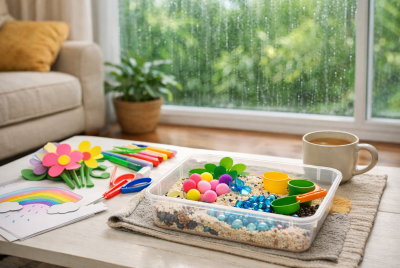Narcissistic Parent: How to Spot One, Cope, and Heal
We may earn a commission for purchases made using our links. Please see our disclosure to learn more.
It’s like being stuck in the shadow of someone who must always be the star when you grow up with a narcissistic parent. They draw you closer, yet they never give you a chance to breathe. You may not become aware of the effects of your incessant drive to dominate, criticize, and take center stage until you are an adult. If you have a parent like this, you are aware that parenting is a completely different animal and not simply “difficult.”
So, let’s discuss it. Let’s examine what a narcissistic parent is, how they impact their children, and—the best part—how to escape their control and begin living for yourself. I understand that it may seem easier said than done, but bear with me. Together, we are in this.
What Exactly Is a Narcissistic Parent?
A narcissistic parent isn’t just a “me-first” person. They’re a “me-only” person. They’re the type who always needs to be admired and might treat you as more of an accessory than an actual person. It’s like their world revolves around how great they look, how well they’re doing, and how much praise they can soak up. And guess what? They’ll use you to get all of that if they can.
Top Signs Your Parent Might Be Narcissistic
If you’re wondering if this really fits your parent, here are some dead giveaways. (Grab a coffee, because you might find this hits close to home.)
- They Need Constant Attention
- Ever felt like your parent would turn every little thing you do into a “look-at-me” moment? That’s because they crave attention, sometimes more than air.
- No Empathy in Sight
- Empathy? Forget it. They can’t relate to what you’re feeling unless it’s about them. You could be down, and they’ll still find a way to make it about their “struggles.”
- Master Manipulators and Guilt Trips
- These parents are masters of guilt. They’ll make you feel responsible for everything, including their happiness (which is a burden nobody should have).
- Hyper-Critical and Judgmental
- They love to keep you “humble.” Nothing you do will ever feel good enough for them. If they’re not calling you out on one thing, they’re onto the next.
- No Boundaries, Ever
- They don’t really understand personal space. Your achievements are theirs to brag about, your mistakes theirs to magnify.
Different Flavors of Narcissistic Parents
Not all narcissistic parents act the same. Here’s a look at some of the usual suspects:
- The Grandiose Parent: They live vicariously through you and will bask in your achievements, as long as they’re brag-worthy.
- The Victim Parent: Everything is a sob story. If you’re not feeling sorry for them, they’ll make sure you do soon enough.
- The Competitive Parent: Imagine a parent who sees you as competition. They’ll even try to outshine you at your own birthday party.
Growing Up Under a Narcissistic Parent
Living with a narcissistic parent can make you feel like you’re never enough. That voice in your head that says, “You could’ve done better”? Yeah, that’s probably them. You end up dealing with low self-esteem, fear of failure, and a need for perfection because anything less is just “disappointing.” And here’s the real kicker—these issues tend to spill over into adulthood, affecting friendships, romantic relationships, and even your own self-worth.
Gaslighting: Their Secret Weapon
Ever had a parent make you question your reality? Like you could swear they said one thing, but now they’re acting like it never happened? That’s called gaslighting. They’ll twist stories, deny the truth, and make you think you’re the “crazy” one. It’s disorienting, exhausting, and a classic tactic of narcissistic parents.
The “Golden Child” vs. The “Scapegoat”
A lot of times, a narcissistic parent won’t treat all their kids the same. One might be the “golden child” (the favorite who can do no wrong) while another becomes the “scapegoat” (the one who’s always at fault). This dynamic messes with sibling relationships big time, pitting siblings against each other. If you were ever wondering why you and your brother don’t talk much, this might be it.
How Narcissistic Parents Create People-Pleasers
Growing up in a narcissistic household often means you end up doing anything to keep the peace. You learn to read moods, anticipate needs, and make sure everything’s just right—all for the sake of avoiding conflict. This people-pleasing trait can stick with you well into adulthood, making it hard to set boundaries or say “no.”
So, Can a Narcissistic Parent Ever Change?
In short? Probably not. Narcissism is tough to treat, mostly because narcissists don’t think they have a problem (it’s everyone else who’s got issues, right?). Even therapy is unlikely to make a huge difference unless they genuinely want to change, which—let’s face it—is pretty rare.
Setting Boundaries with a Narcissistic Parent (Yes, It’s Possible)
Learning to set boundaries is like building a protective wall around yourself. This is where you decide what you’re willing to tolerate. Narcissistic parents hate boundaries (because boundaries mean control slips away from them), so expect some pushback. But stick to your guns. Boundaries are your friend, and trust me, they make a huge difference.
Healing from the Influence of a Narcissistic Parent
Healing is possible, but it’s a process, not a quick fix. It’s about peeling away all those layers of self-doubt, guilt, and insecurity that they piled onto you. Therapy can help a lot. So can talking with others who get it. Joining a support group or even finding forums where people share similar experiences can be like a lifeline.
You’re Not Alone in This
If you’re reading this and nodding along, let me assure you, you’re not alone. So many people have lived through this kind of upbringing. There’s strength in numbers, and there are communities out there ready to welcome you, whether online or in person.
Ways to Deal with a Narcissistic Parent (When You Can’t Just Walk Away)
- Limit Contact: If you can’t cut ties, at least minimize the interactions. Less time with them means less stress.
- Use the “Gray Rock” Technique: This one’s gold. Basically, don’t give them anything they can latch onto. Be as uninteresting and neutral as a gray rock. It’s not fun for them, so they’ll often back off.
- Remember: It’s Not You, It’s Them: Their behavior reflects their issues, not your worth.
Building a Strong Support System
Finding friends, mentors, or support groups who understand can make a huge difference. They’ll remind you that you’re not crazy, and they’ll be there when you need a reality check.
Self-Care: Your Best Friend in Healing
Self-care isn’t just bubble baths and face masks (although, hey, those are great too). It’s about finding what recharges you—like journaling, meditation, working out, or even just going for a walk. You’ve probably spent so long focusing on them that it feels weird to do something just for you. But trust me, it’s worth it.
Rediscovering Who You Are (Without Their Shadow)
Children of narcissistic parents often grow up never fully knowing who they are because they’re always told who they should be. Now’s your chance to explore. What do you love? What makes you laugh? Finding out who you are apart from them can be freeing.
Finding Joy and Peace Beyond Their Reach
After so many years of dealing with criticism and control, it might feel strange to go out and live just for yourself. But don’t let them steal your joy. Take up a hobby, spend time with people who make you feel good, and start building a life that feels fulfilling to you.
The Tricky Road to Forgiveness
Forgiving a narcissistic parent can feel like a huge ask. But remember, forgiveness doesn’t mean you’re saying what they did was okay. It just means you’re choosing to let go of the hold their actions have on you. It’s more for you than for them.
Key Research Studies on the Impact of Narcissistic Parenting and Child Development
“Narcissism, Parenting, Complex Trauma: The Emotional Consequences of Traumatic Narcissism” by Hull (2015)
This paper explores how narcissistic parents can cause complex trauma in their children, affecting their identity and relationships. It discusses the developmental and clinical implications of such parenting styles.
“Can Parenting Styles Affect the Children’s Development of Narcissism? A Systematic Review” by Longobardi (2016)
This systematic review analyzes various studies to determine how different parenting styles influence the development of narcissistic traits in children. It highlights the significant role of parental behavior in shaping a child’s personality.
Books for Understanding and Healing
- “Will I Ever Be Good Enough?: Healing the Daughters of Narcissistic Mothers” by Dr. Karyl McBride
This popular book is specifically written for those who grew up with narcissistic mothers. It provides insights into recognizing the traits of a narcissistic parent, healing from the effects, and moving forward. - “Children of the Self-Absorbed: A Grown-Up’s Guide to Getting Over Narcissistic Parents” by Nina W. Brown
This book gives a detailed look into narcissistic parenting and offers practical steps for recovery and self-discovery. - “Adult Children of Emotionally Immature Parents: How to Heal from Distant, Rejecting, or Self-Involved Parents” by Lindsay C. Gibson
Focused on the effects of emotionally immature (often narcissistic) parents, this book helps readers understand their upbringing and break free from unhealthy dynamics. - “The Self-Love Workbook: A Life-Changing Guide to Boost Self-Esteem, Recognize Your Worth and Find Genuine Happiness” by Shainna Ali
A great resource for rebuilding self-worth, this workbook guides readers through exercises to nurture self-love and confidence.
Closing Thoughts: Breaking Free
Growing up with a narcissistic parent is hard. It leaves scars, and it takes time to heal. But with patience, support, and a willingness to prioritize your own happiness, you can break free from their grip. Take it one step at a time, and give yourself credit for every inch of progress.
FAQs About Narcissistic Parents
- How do I know if my parent is narcissistic?
- If they need constant praise, lack empathy, or make everything about them, they might fit the bill.
- Do narcissistic parents actually love their kids?
- They may care, but their love often feels conditional—based on how well you serve their needs.
- Is it okay to distance myself from my parent?
- Absolutely. If it helps you feel safer and healthier, it’s more than okay.
- Can therapy really help?
- Yes. Therapy can be a game-changer, helping you sort through emotions, set boundaries, and heal.
- How do I handle the guilt of setting boundaries?
- Remember, boundaries are a form of self-respect. The guilt will lessen over time as you grow more confident.
Breaking away from a narcissistic parent’s influence is hard, but you deserve peace and joy. Healing is possible, and every small step counts. It’s your life—live it on your terms.




